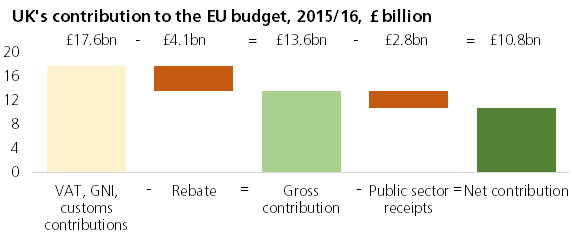
In March, British prime minister Theresa May triggered Article 50 of the Lisbon Treaty, the official EU exit clause. Britain has two years to agree a divorce deal.
But how much will the formal departure from the union cost?
The Insitute of Chartered Accountants believes the figure will be a whole lost less than this, suggested the UK may have to pay as little as £5bn to leave the union.
Micheal Izza, the group’s chief executive, said in a blog post:
Ultimately the amount the UK will pay on or after its depature will be a matter of negotiation. However, we would like to see both sides agree on the bill sooner rather than later, so that attention can be focused on the more important aspects of the negotiations.
The government will enact a Great Repeal Bill ending the primacy of EU law in the UK. Some laws will be kept, others will be changed or removed altogether.
How well do you really know your competitors?
Access the most comprehensive Company Profiles on the market, powered by GlobalData. Save hours of research. Gain competitive edge.

Thank you!
Your download email will arrive shortly
Not ready to buy yet? Download a free sample
We are confident about the unique quality of our Company Profiles. However, we want you to make the most beneficial decision for your business, so we offer a free sample that you can download by submitting the below form
By GlobalDataUnpicking 43 years of treaties and legislation will not be a straightforward task.
Draft negotiations from the EU were seen by Reuters this week and it looks like Britain will be paying off obligations to Brussels for years after Brexit.
The documents didn’t put a figure on what Britain might have to pay but said the exit treaty should both set “a global amount” to honour financial obligations.
It is likely that the payment to the EU will include the UK’s share of outstanding pensions liabilities, loan guarantees and spending on UK-based projects. The UK has ongoing spending commitments to the EU’s Investment Plan for jobs and growth for example.
The UK may also pay to participate in some other EU programmes after Brexit, May has said.
Michel Bernier, the chief negotiator for Brussels, said in December last year that the UK must keep paying “tens of billions” annually into the EU budget until 2020.
Speaking to MPs on the House of Commons European Scrutiny Committee in February, Britain’s former ambassador to the EU Ivan Rogers said a €40bn to €60bn exit bill was a “genuine” possibility.
The Centre for European Reform — a broadly pro-EU think tank — has produced estimates that range from a payment of €24bn to €73bn.
A separate €60bn figure was reached by Financial Times reporter, Alex Barker, who produced a detailed report for the think tank in February on the owed budget contributions that the EU would charge the UK.
“In pure economic terms, even that €60bn estimate is relatively insignificant, especially when paid over many years,” Barker said in the report.
“But disputes over EU money are almost always highly-charged and occasionally nasty. A mismanaged negotiation of the bill could easily poison Brexit divorce talks and future UK-EU trade relations,” he warned.
Legally, the UK may not be obliged to make any further payments to the EU. John Redwood, Conservative MP for Wokingham has argued that under Article 50, exit from the EU leaves a country with no further commitments.
The campaign group Lawyers for Britain has also said that there is no basis upon which the UK should be expected to make net payments towards EU pensions or ongoing budget programmes. Instead, the UK should ask for the return of the €9bn it paid to the European Investment Bank.
Brexit secretary David Davis said he had seen no explanation for the €60bn figure or any other amounts on a special edition of BBC’s Question Time last month.
“I don’t know about £50bn, I’ve seen £40bn, £50bn, £60bn, I’ve seen no explanation for any of them. I don’t think we’re going to be seeing that sort of money change hands.”
However he added that the UK would meet “international obligations, but we expect also our rights to be respected too”.








